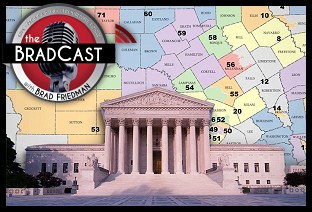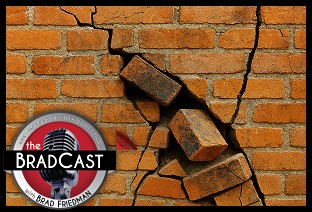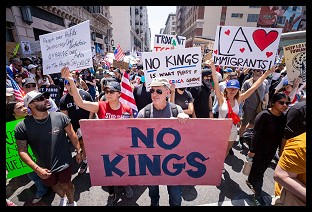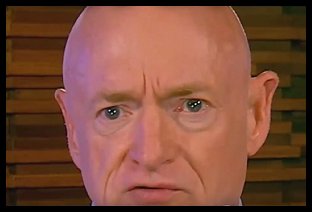 "These remarks display a shameful lack of understanding and sensitivity that is unacceptable in the person charged with enforcing the nation’s laws against voting discrimination," Sen. Ted Kennedy (D-MA) wrote in a question sent to Attorney General Nominee Michael Mukasey today concerning bizarre and objectionable comments made earlier this month by the DoJ's Civil Rights Division Voting Section chief, John Tanner.
"These remarks display a shameful lack of understanding and sensitivity that is unacceptable in the person charged with enforcing the nation’s laws against voting discrimination," Sen. Ted Kennedy (D-MA) wrote in a question sent to Attorney General Nominee Michael Mukasey today concerning bizarre and objectionable comments made earlier this month by the DoJ's Civil Rights Division Voting Section chief, John Tanner.
Tanner, whose recent remarks at the National Latino Congresso in Los Angeles, as video-taped and first reported by The BRAD BLOG earlier this month, have sparked outrage, leading to calls for his firing last week by Senator Barack Obama (D-IL), this past Wednesday by Rep. Jerrold Nadler (D-NY). Civil Rights groups have also called for Tanner to be canned in the wake of his remarks claiming that Photo ID restrictions at the polling do effect the elderly, and that that's a "shame." But, minorities needn't worry because "they don't become elderly. They die first."
"The Voting Section of the Civil Rights Division has failed miserably in its responsibility to enforce the Voting Rights Act during this Administration," Kennedy said in a statement quoted by TPM Muckraker. "The latest shameful revelations from the Section drive home the urgent need for the next Attorney General to install strong leadership to allow the Voting Section to return to its historic role in ensuring access to the ballot."
Kennedy's question to Mukasey, which TPM Muck has in full, ends with "If you are confirmed, will you review Mr. Tanner’s record and consider whether he should be replaced as head of the Voting Section?"
But for those paying very close attention to Mukasey's confirmation hearings last week, his position on the controversial Photo ID issue --- a concern since some 10 to 30 million legally registered voters, largely Democratic-leaning minorities and elderly, are believed not to have such IDs and would therefore be kept from voting --- was troubling.
 We had to review the testimony several times, as given in answer to questions by Sen. Ben Cardin (D-MD), to figure out where he fell on this issue. But a close reading reveals that, while Mukasey offered clear responses objecting to voter suppression issues such as misinformation concerning polling place location, he was far dodgier on the question of polling place Photo ID restrictions.
We had to review the testimony several times, as given in answer to questions by Sen. Ben Cardin (D-MD), to figure out where he fell on this issue. But a close reading reveals that, while Mukasey offered clear responses objecting to voter suppression issues such as misinformation concerning polling place location, he was far dodgier on the question of polling place Photo ID restrictions.
Close review of the transcript --- posted along with the video in full below --- reveals that Mukasey feels that overt disenfranchisement efforts via dirty tricks, such as misleading and/or threatening fliers and phone calls, definitely amounts to "flat-out fraud and pernicious fraud."
His feelings about disenfranchising Photo ID requirements, however, are far different...
"I think if – if a means of identification is made available and accessible," Mukasay told Cardin, the only Senator to ask about these issues during the hearings, "and every step is taken that allows people who have a right to vote to get access to that, to be informed about its availability, then to say it’s the modern-day equivalent of the poll tax seems to be a little bit over the top."
In fact, two federal judges had found a Georgia Photo ID law to be unconstitutional, after Tanner had approved it on behalf of the Justice Department against the strong advice of four out of five of the career attorneys who had reviewed it. One of the federal judges described the law as a "modern day Jim Crow-era poll tax."
Yet Mukasey, whose answers on this point were as crafty as those on his definition of "torture," failed to offer any indication of concern that voters who had no such card would be kept from exercising their legal right to vote under such laws.
"If they’re difficult [to obtain], then that difficulty has to be overcome and a way has to be found to get people with disabilities --- to make those cards available to the people with disabilities. If they’re homebound, have people go to their homes if necessary. I’m not saying that those cards should be difficult to get or have," he told Cardin, who seemed to be satisfied by the response.
A short follow-up question on the second day of hearings also seemed to please Cardin who --- who would be well advised to re-review the text transcript very carefully, as we hope you will as well, before he signs off on Mukasey.
By the way, has anybody wondered how the thousands of families who lost all of their possessions in this week's California fires would be able to vote in next month's elections if such restrictive Photo ID laws were in place in the Golden State?
Tanner has been subpoenaed for what should be rather lively hearings in the U.S. House Judiciary Committee next Tuesday at 10am ET, featuring questions by both Nadler and the committee's elderly, yet not dead African-American chairman, John Conyers.
The video and complete text transcript from last week's questions from Sen. Ben Cardin to Judge Michael Mukasey on these points at his Senate Judiciary Confirmation Hearings follow below...
on the nomination of Judge Michael Mukasey for Attorney General
DAY 1 - PM Session, October 17, 2007
SEN. BEN CARDIN: Let me talk about election law for a moment, if I might. This I guess is a typical example of my concern about the Civil Rights Division. The Civil Rights Division traditionally has worked to enfranchise - to provide more opportunities for individuals to vote, to remove obstacles. Yet in 2002, I think, there was a major shift, when it looks like the Dept. of Justice Civil Rights Division was aimed more at trying to prevent fraud than it was to remove obstacles to voter participation. And it reached I think the low point with the sign-off on the Georgia Voter ID. Even though the Secretary of State of Georgia could give us no examples of people using false identification or false persons to vote.
Georgia moved forward with the identification, the Civil Rights Division signed off on it, against the advice of the career attorneys. Signed off on it. The courts ultimately decided that it was --- it would not go forward, it violated the law, and it would work to disenfranchise --- particularly minority voters, those who are homeless, those who are lower income, from being able to participate and vote.
So I guess my question to you is, will your priority, in your instructions to the Civil Rights Division, be the traditional role of the Dept. of Justice in trying to remove obstacles to particularly minorities being able to vote, or will it be more to try to do the Georgia-type of Voter ID laws?
JUDGE MICHAEL MUKASEY: Respectfully, I don't think it's an either/or proposition. I think that voter enfranchisement, voter empowerment, opening up the vote, opening up access to the vote, and preventing people who shouldn't vote from voting, are essentially two sides of the same coin. That coin is a very valuable one - it's the value of the vote.
The - I used to - one of the joyful duties I had as a judge was swearing in new citizens, and a big part of the talk I gave, the brief talk that I gave to them afterwards, always involved their obligation to inform themselves and to vote. Nobody who votes wants to see his or her vote diluted by the vote of someone who is not entitled to vote. But people who want to vote who are authorized to vote, and should vote, has to be - have to have access to that, and everything has to be done to keep that open.
CARDIN: Do you agree with the court decision in Georgia that said that the Voter ID was the modern-day poll tax, and that it would not be allowed to go forward within Georgia?
MUKASEY: I don't know whether that -
CARDIN: I think that's a direct quote from the judge.
MUKASEY: I think if - if a means of identification is made available and accessible, and every step is taken that allows people who have a right to vote to get access to that, to be informed about its availability, then to say it's the modern-day equivalent of the poll tax seems to be a little bit over the top.
CARDIN: If you're a homeless person, if you're a person with disability, if you're in the immigrant community, these ID cards are very difficult and sometimes offensive.
MUKASEY: If they're difficult, then that difficulty has to be overcome and a way has to be found to get people with disabilities --- to make those cards available to the people with disabilities. If they're homebound, have people go to their homes if necessary. I'm not saying that those cards should be difficult to get or have…
CARDIN: I guess my point would be that I would certainly want the Civil Rights Division looking at the balancing between making sure that only those who are qualified to vote, vote, but to try to get the largest possible participation in our election process. And if we put our energy into trying to weed out the few that maybe are committing fraud, and as a result we end up with a huge number who are disenfranchised, that shouldn't be what the Dept. of Justice is doing --- I hope you agree with that.
MUKASEY: I certainly do.
CARDIN: Thank you, I appreciate that. Let me just mention very quickly...we had some problems, there's some new problems developing in the election procedures where candidates and parties are using an effort to disenfranchise voters as a way to win elections. We saw that with misinformation sent out in the most recent elections, concerning voting dates - giving the wrong dates to voters, to tell the minority community - targeted to minority communities, that if you have unpaid parking tickets you'll be arrested if you try to vote, if you haven't paid your taxes you'll be arrested, things like that, that are aimed at minority communities to suppress their votes.
I hope that you will show interest in trying to figure out a strategy where we can combat those types of practices. There's legislation moving through Congress that Senator Obama, Senator Shuster, and myself have co-sponsored. I hope that you will take a look at that.
MUKASEY: I certainly will. I certainly will - I mean, that's flat-out fraud, and it's pernicious fraud.
CARDIN: Thank you. Thank you Mr. Chairman.
DAY 2, October 18, 2007
CARDIN: Judge Mukasey, I would like to follow up on the discussion we had yesterday on voter suppression. In your response, you said that voter fraud and voter suppression should go hand in hand and it should not be an either-or situation. And I agree with that. There's no disagreement that we want to make sure that those who are qualified to vote are the only ones that do vote, and we want to fight voter suppression issues. The reasons for my questions is that many of us believe there has been resources taken away from voter suppression, and my question to you is whether you will commit to make sure there is adequate resources and attention in your department to voter suppression issues.
MUKASEY: I well understand the reason for your concern, and I share it, and I will try to assure that.
CARDIN: Thank you, and I very much appreciated your response in regards to the more recent types of attempts at voter fraud, to suppress votes by wrong information given out on election day, and I very much appreciate your attention and response on that issue.
MUKASEY: And when I characterized that as fraud, I wasn't trying to be cute and say it's distinct from voter suppression - it is fraudulent voter suppression, it is to be put down.
CARDIN: Thank you.
MUKASEY: So there's no ambiguity.
CARDIN: I appreciate that definitive answer.


 SCOTUS Ruling a How-To for Unlawful Gerrymandering on 'Eve' of Critical Election Year: BradCast' 12/17/25
SCOTUS Ruling a How-To for Unlawful Gerrymandering on 'Eve' of Critical Election Year: BradCast' 12/17/25 Bricks in the Wall:
Bricks in the Wall: 'Green News Report' 12/16/25
'Green News Report' 12/16/25
 'This One Goes to 11': Weekend of Violence, Tragic Murder of Rob Reiner: 'BradCast' 12/15
'This One Goes to 11': Weekend of Violence, Tragic Murder of Rob Reiner: 'BradCast' 12/15 Sunday 'WTF?' Toons
Sunday 'WTF?' Toons Trump Now Losing One
Trump Now Losing One 'Green News Report' 12/11/25
'Green News Report' 12/11/25 Dems Continue Stunning 2025 Election Streak: 'BradCast' 12/10/25
Dems Continue Stunning 2025 Election Streak: 'BradCast' 12/10/25 Petrostates and Propagandists Undermining Climate Science: 'BradCast' 12/9/25
Petrostates and Propagandists Undermining Climate Science: 'BradCast' 12/9/25 'Green News Report' 12/9/25
'Green News Report' 12/9/25 The High Cost of Trump's Terrible Policy Making: 'BradCast' 12/8/25
The High Cost of Trump's Terrible Policy Making: 'BradCast' 12/8/25 Sunday 'All in a Day's Work' Toons
Sunday 'All in a Day's Work' Toons Dems Fight to Avoid the GOP's Massive, Year-End Health Care Cliff: 'BradCast' 12/4/25
Dems Fight to Avoid the GOP's Massive, Year-End Health Care Cliff: 'BradCast' 12/4/25 'Green News Report' 12/4/25
'Green News Report' 12/4/25 A 'Flashing Red Warning Sign' for GOP: 'BradCast' 12/3/25
A 'Flashing Red Warning Sign' for GOP: 'BradCast' 12/3/25 Hegseth, War Crimes and DoD's 'Politicization Death Spiral': 'BradCast' 12/2/25
Hegseth, War Crimes and DoD's 'Politicization Death Spiral': 'BradCast' 12/2/25 Follow the
Follow the  With Thanks, No Kings and Good Cheer
With Thanks, No Kings and Good Cheer Presidential Illegality and Duty to Disobey
Presidential Illegality and Duty to Disobey President of United States Calls for Killing Democratic Officials: 'BradCast' 11/20/25
President of United States Calls for Killing Democratic Officials: 'BradCast' 11/20/25 Is MAGA Finally Beginning to Fall Apart?: 'BradCast' 11/19/25
Is MAGA Finally Beginning to Fall Apart?: 'BradCast' 11/19/25 Trump's Terrible, Horrible, No Good, Very Bad Week: 'BradCast' 11/18/25
Trump's Terrible, Horrible, No Good, Very Bad Week: 'BradCast' 11/18/25
 VA GOP VOTER REG FRAUDSTER OFF HOOK
VA GOP VOTER REG FRAUDSTER OFF HOOK Criminal GOP Voter Registration Fraud Probe Expanding in VA
Criminal GOP Voter Registration Fraud Probe Expanding in VA DOJ PROBE SOUGHT AFTER VA ARREST
DOJ PROBE SOUGHT AFTER VA ARREST Arrest in VA: GOP Voter Reg Scandal Widens
Arrest in VA: GOP Voter Reg Scandal Widens ALL TOGETHER: ROVE, SPROUL, KOCHS, RNC
ALL TOGETHER: ROVE, SPROUL, KOCHS, RNC LATimes: RNC's 'Fired' Sproul Working for Repubs in 'as Many as 30 States'
LATimes: RNC's 'Fired' Sproul Working for Repubs in 'as Many as 30 States' 'Fired' Sproul Group 'Cloned', Still Working for Republicans in At Least 10 States
'Fired' Sproul Group 'Cloned', Still Working for Republicans in At Least 10 States FINALLY: FOX ON GOP REG FRAUD SCANDAL
FINALLY: FOX ON GOP REG FRAUD SCANDAL COLORADO FOLLOWS FLORIDA WITH GOP CRIMINAL INVESTIGATION
COLORADO FOLLOWS FLORIDA WITH GOP CRIMINAL INVESTIGATION CRIMINAL PROBE LAUNCHED INTO GOP VOTER REGISTRATION FRAUD SCANDAL IN FL
CRIMINAL PROBE LAUNCHED INTO GOP VOTER REGISTRATION FRAUD SCANDAL IN FL Brad Breaks PA Photo ID & GOP Registration Fraud Scandal News on Hartmann TV
Brad Breaks PA Photo ID & GOP Registration Fraud Scandal News on Hartmann TV  CAUGHT ON TAPE: COORDINATED NATIONWIDE GOP VOTER REG SCAM
CAUGHT ON TAPE: COORDINATED NATIONWIDE GOP VOTER REG SCAM CRIMINAL ELECTION FRAUD COMPLAINT FILED AGAINST GOP 'FRAUD' FIRM
CRIMINAL ELECTION FRAUD COMPLAINT FILED AGAINST GOP 'FRAUD' FIRM RICK SCOTT GETS ROLLED IN GOP REGISTRATION FRAUD SCANDAL
RICK SCOTT GETS ROLLED IN GOP REGISTRATION FRAUD SCANDAL VIDEO: Brad Breaks GOP Reg Fraud Scandal on Hartmann TV
VIDEO: Brad Breaks GOP Reg Fraud Scandal on Hartmann TV RNC FIRES NATIONAL VOTER REGISTRATION FIRM FOR FRAUD
RNC FIRES NATIONAL VOTER REGISTRATION FIRM FOR FRAUD EXCLUSIVE: Intvw w/ FL Official Who First Discovered GOP Reg Fraud
EXCLUSIVE: Intvw w/ FL Official Who First Discovered GOP Reg Fraud GOP REGISTRATION FRAUD FOUND IN FL
GOP REGISTRATION FRAUD FOUND IN FL

































